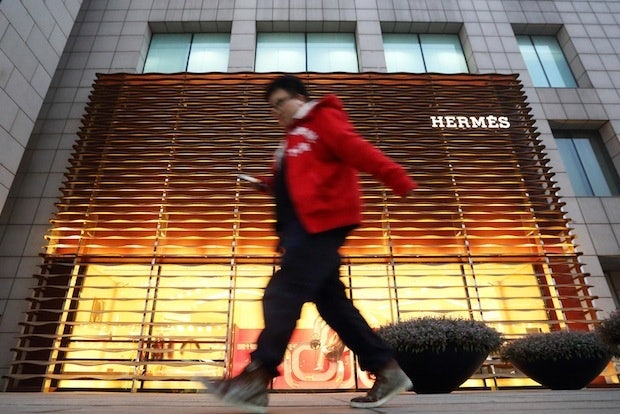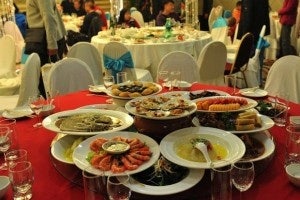When It Comes To Lagging Growth, No One Cause Is The Culprit#

The Hermes store in Beijing. (Tomohiro Ohsumi/Bloomberg)
There's no denying that China's luxury market as a whole is in slowdown mode. During the Chinese new year holiday period from January 20 to February 20 of this year, luxury spending on the mainland dropped to $830 million, a decrease of 53 percent from the previous year. China’s total luxury growth rate has declined from 30 percent last year to the single digit of 7 percent this year, and even some retailers in Europe are saying that they are seeing fewer Chinese tourists coming through their doors. These figures have led to a great deal of speculation regarding what exactly is hampering growth—namely, whether or not the root of luxury companies' China problems is truly Xi Jinping’s anti-corruption campaign.
For most commentators, the crackdown is the only cause worth mentioning. A South China Morning Post article recently asserted that many luxury brands have “blamed their woes squarely on Chinese government policy, specifically its crackdown on ostentation and luxury gift-giving as part of its anti-corruption campaign." In contrast, a Business of Fashion column recently argued that the anti-corruption campaign is “masking the real causes of the luxury slowdown,” which are actually "broad changes in Chinese consumer behaviour and sentiment."
Accurate numbers are hard to come by when it comes to total effects on purchases made for bribery purposes, because these gifts are inherently clouded in secrecy. From contextual evidence, however, we can point to a variety of several causes, some of which may be interconnected, that are all likely doing their part to contribute to the slowdown. These include not only the anti-extravagance campaign and changing consumer taste, but also China's overall slowing economic growth.

The Chinese government is working hard to convince the public that it will no longer tolerate taxpayer money going to lavish banquets. (Global Post)
There is no doubt that the anti-corruption campaigns are in fact taking their toll. Some industries notorious for thriving off official “gifting” practices, such as luxury watches and Chinese spirits, have been much harder hit than others on a timeline that coincides very closely with the corruption crackdown. Industries associated with official banquet culture are also suffering, including high-end restaurants, five-star Beijing hotels, suppliers of expensive food delicacies, high-end catering, and even the flower industries associated with providing banquet centerpieces. "No industry that has relied on official spending is safe it seems," says Abe Sauer at BrandChannel.
Some companies are even willing to admit publicly that they’ve been hurt by the crackdown. For example, Pernod Ricard blamed the campaign on its drop in whisky sales, and when Burberry's numbers were not looking so good, the company's chief financial officer Stacey Cartwright publicly admitted that gift-giving culture had been an important source of revenue for the company.
However, looking at the fact that not all individual companies are doing terribly makes the picture much more complicated. Despite the fact that the crackdown hasn’t ended, Burberry, for example, has since bounced back. Meanwhile, some comparatively low-key fashion companies are doing quite well, while haute couture lines are still working on expanding their presence in the country. This points to the argument that changing consumer habits which lean toward less ostentatious, logo-heavy styles may be driving this trend. "The truth is, the luxury market in China was in decline well before the anti-corruption campaign was introduced," states Business of Fashion, which argues, "While many consumers still purchase luxury goods with blatant logos stamped across them as loud displays of status and wealth ... new consumption patterns can be seen, especially amongst young people."
Further complicating the issue is the fact that it is difficult to tell how much of this decline in an obsession with "bling" is influenced by the crackdown itself. Watches once again provide the most obvious example of officials taking pains to avoid conspicuous displays of wealth. According to Euromonitor International, "This time last year, there were more Chinese government officials and company executives sporting Cartier or Rolex timepieces than you could shake a stick at. Today, many of those same luxury timepieces are locked up in drawers at home or are on sale at second-hand stores such as Brand Off in Shanghai. Most government officials wouldn’t be seen dead wearing one." Even officials' wives haven't been exempt from being called out on Weibo for the logos on their handbags, showing that not all stealth wealth may be simply a matter of voluntary change of taste. Although Chinese consumers' tastes have been getting more sophisticated on their own, it's hard to tell how much this trend is being helped along by government diatribes against ostentation.
Also not to be discounted are China's slowing economic growth and the amount of government funding going to public works. China is still heavily invested in driving economic growth through the funding of infrastructure projects, but as economic recovery has progressed since the 2008 crisis, the government has been less extravagant with its public financing of these projects. Although not connected to the anti-extravagance campaign, less public money for major projects leads to far less opportunity for bribery, which in turn may be indirectly contributing to the slowdown. In addition, China's lower-than-predicted GDP growth numbers and the economic uncertainty accompanying the leadership transition may have had their impacts on retail.
The bottom line is that even amidst all this short-term uncertainty, luxury companies still see China as an investment for the long run. Although they may be adjusting their expansion strategies for now, they still see the world's largest luxury market as first and foremost a growth opportunity.